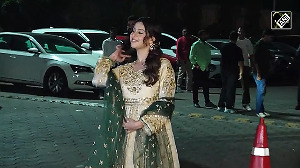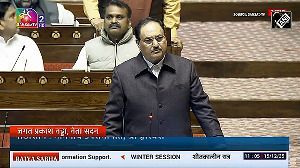The capture of Iraq's former president Saddam Hussein had all the elements of surprise, drama and shock. Those who expected to see the arrogant face of a savage tyrant who made millions of people shake with fear were astonished to see a bedraggled old man with long-unwashed hair, submitting docilely to a United States army doctor examining him for tooth decay and lice. Among many Arabs, the tame surrender produced disdain: the man who pretended to be a modern-day Saladin and our epoch's greatest Arab warrior turned out to be a coward who refused to use the gun he was carrying. For those Iraqis who had suffered his awesome oppression, it was a cause for jubilation.
The circumstances in which Hussein was reportedly 'discovered' raise many questions. His hideout was outside a derelict, ramshackle, mud hut with a tiny bedroom and a badly maintained kitchen, without even a latrine. The 'spider hole' was barely enough for a single person to lie down in. Its single opening was just three feet by one-and-half feet. It was camouflaged with bricks and dirt. Hussein could not have come out of it without help from the outside, especially in removing the camouflage cover.
All this, and the fact that Hussein immediately offered to negotiate (according to Major Brian Reed, of the 4th Infantry Division) suggests that he was not so much in hiding as a prisoner. This is reinforced by the fact that Hussein was carrying no communication device, although he had $750,000 in cash. Two unidentified men were detained with him along with AK-47 rifles. In all probability, Hussein was betrayed by his own bodyguards who had an eye on the $25 million reward. An Arab newspaper has identified his betrayer as General Mohammed Ibrahim Omar al-Muslit, a relative and companion-in-hiding, who led the US troops to the hideout after drugging him.
This means that Hussein could not have directed or orchestrated the armed resistance to the occupation powers in Iraq. He was a symbol of war more for Washington than for the Iraqi people. For most of them, he was a hated, but already deposed and disgraced, ruler, hardly about to return to power.
This should at once warn us against the euphoria that is being drummed up in many capitals of the world, and duly conveyed by sections of the media elated in the manner of American pro consul L Paul Bremer. Not many people will shed tears for a dictator who was infamous for his extraordinary brutality. But it's important to recall that the US and its allies did not go to war to capture Hussein. Rather, they wanted to disarm Iraq of its alleged weapons of mass destruction not one of which has been found so far. Hussein's capture does not alter the character or (in)justice of the war or the occupation. 'Operation Iraqi Freedom' remains thoroughly unjust.
The latest events raise three issues: What lies ahead for Iraq? Will relations between Washington and other major powers change? What will and should happen to Hussein? His capture will not greatly alter the ground-situation or the insurgency in progress. (After his capture, violence remains unabated. And there have been pro-Saddam demonstrations.) 'Saddam remnants' or Baathist 'loyalists' and 'dead-enders' are only one of the many groups fighting the Anglo-American forces. These include both political-nationalist organisations like the Unification Front for the Liberation of Iraq or the Kurdish PKK, and religious guerrillas like the Wahhabi Sunni Muslim-sponsored Committee of the Faith, and many more Shia-Islamist groups. These are reported to number anything from 12 to 30.
The Baathists have not been the principal suppliers of arms, funds and logistical help to these groups. Nor have they carried out spectacular fidayeen actions comparable to theirs. Perhaps the only thing that might change temporarily is the balance between the secular and Islamist elements in the Iraqi resistance. But a much stronger trend in this regard is the growing alienation of the moderates among the Shias, who form 60 percent of Iraq's population, from the US-controlled Coalition Provisional Authority. Their most highly regarded leader, Grand Ayatollah al-Sistani is bitter that the Americans want to create the proposed constituent assembly by nomination, instead of elections. But Hussein's capture is unlikely to produce a further major shift in their stand.
Will the capture boost George Bush domestically and help him mend damaged relations with his Western allies? Leaders of America's estranged Western allies like Jacques Chirac and Gerhard Schroeder should have questioned the US's locus standi in acting like a self-appointed gendarme in Iraq. Instead, they welcomed Hussein's capture. But they are deeply embittered at the blatant grabbing of Iraq's $18.6 billion reconstruction contracts by Pentagon cronies -- described even by the Senate Foreign Relations Committee's Joseph R Biden as a 'totally gratuitous slap that does nothing to protect our security interests and everything to alienate countries we need with us in Iraq... We stick a finger in the eye of those whose help we have been seeking.' The latest disclosures about Halliburton's rip-off in selling petroleum at highly inflated prices to US forces won't help matters either.
Hussein's arrest is unlikely to silence President Bush's domestic critics. It might temporarily boost his approval ratings, now the lowest since the end of active combat operations. But how much that will help him in the presidential elections, which are a good 11 months away, is open to question. Eleven months is a long, long time in politics. Other factors will probably play a greater role than the capture of an already deposed dictator. Countering Bush's transient advantage is rising popular disappointment at growing US casualties in Iraq, now in excess of 450 dead.
What happens to Hussein? A number of leaders, including Bush, pledge to do justice by putting him on trial. But there are wide variations. Some Iraqi leaders favour virtual 'mob justice' -- even torture or summary trial leading to execution. Some insist that he must be tried in Iraq. Yet others want a full-scale international tribunal. The US seems inclined to a limited trial within Iraq. It certainly does not want the trial to go into issues other than Hussein's culpability for killing, torturing and brutalising the Iraqi people.
The limited trial idea is seriously, gravely, fraught. Iraq is not a sovereign state while under occupation. Its legal system was badly corrupted under Hussein. It cannot be reasonably expected to deliver justice under his immediate successors. Under international law, Hussein is prima facie guilty of two acts of aggression: invasion of Iran in 1980, and of Kuwait in 1990. But he was arrested by Iraq's occupation powers, which themselves committed aggression against it in violation of international law. A trial designed and ordered by them will lack legitimacy, even elementary legality.
An Iraqi tribunal nominated by the CPA or the Iraqi Governing Council will be a kangaroo court. The IGC is but a puppet of the CPA and lacks even a semblance of a representative status. A kangaroo court, in which the US is the judge, jury and executioner, would only compound injustice and tyranny in Iraq.
The only way to do justice in the present case is to put Hussein on trial in a United Nations-sponsored international tribunal with a multilateral composition which is seen to be credible and impartial. The trial must be public. During it, Hussein must be treated in conformity with the Geneva Conventions. He must not be humiliated or shown in a degrading light as he was during his first television appearance under occupation.
Most important, the trial must not be allowed to obscure and suppress the circumstances pertinent to Iraq's invasion of Iran, Hussein's use of chemical weapons against the Iranians and later, allegedly, against the Kurds. This will legally establish what has long been known: Washington's encouragement of the Hussein regime throughout the Iran war, its passing on of vital intelligence about Iranian forces' location, its transfer of heavy conventional weaponry, and above all, its shipping of biological agents to Hussein, including the anthrax bacillus, a source of the potentially fatal botulinum toxin, and three deadly strains of Clostridium bacteria -- which cause systemic illness, other toxic effects and diseases attacking lungs, brain, spinal cord and heart.
Hussein was a US protégé right from the mid-1970s and received generous support, especially after the 1979 Iranian Revolution, which worried Washington so sick that it blindly adopted the notoriously short-sighted 'my enemy's enemy' posture.
The international tribunal should also go into the issue of economic sanctions which Hussein's misadventures brought upon the Iraqi people, but which were imposed and prolonged by the Western powers. These have led to one million deaths, half of them of children since 1990. Justice in the Saddam Hussein trial cannot be separated from responsibility, direct or indirect, for equipping and encouraging him to do harm. Nor can it be divorced from fixing culpability for the death of at least 7,935 Iraqi civilians (maximum 9,766) since the war began.





